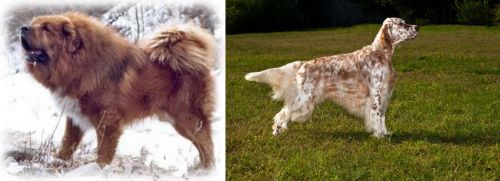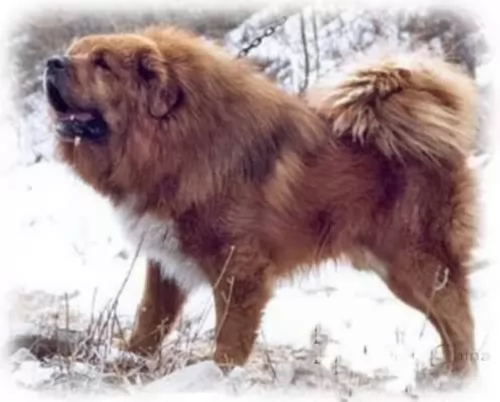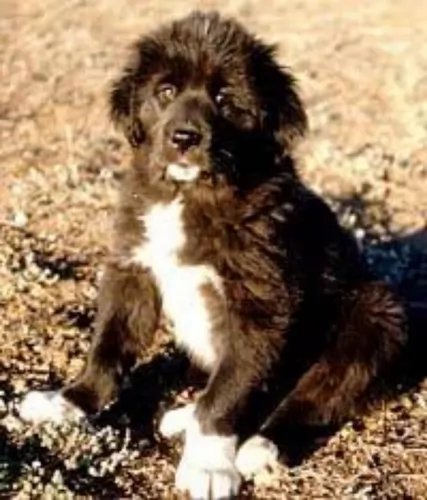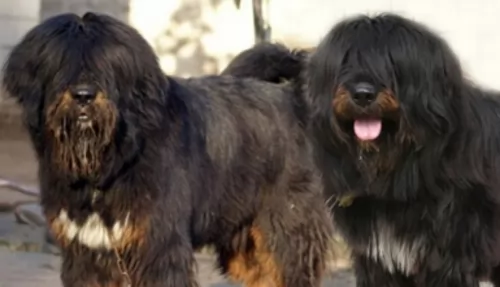 MyDogBreeds
MyDogBreeds Tibetan Kyi Apso is originated from China but English Setter is originated from United Kingdom. Both Tibetan Kyi Apso and English Setter are having almost same height. Tibetan Kyi Apso may weigh 35 kg / 77 pounds lesser than English Setter. Both Tibetan Kyi Apso and English Setter has almost same life span. Both Tibetan Kyi Apso and English Setter has almost same litter size. Both Tibetan Kyi Apso and English Setter requires Moderate maintenance.
Tibetan Kyi Apso is originated from China but English Setter is originated from United Kingdom. Both Tibetan Kyi Apso and English Setter are having almost same height. Tibetan Kyi Apso may weigh 35 kg / 77 pounds lesser than English Setter. Both Tibetan Kyi Apso and English Setter has almost same life span. Both Tibetan Kyi Apso and English Setter has almost same litter size. Both Tibetan Kyi Apso and English Setter requires Moderate maintenance.
 The Tibetan Kyi Apso is an ancient rare breed. In fact, it is one of the rarest breeds on earth. Coming from Tibet, the Kyi Apso guarded livestock and homes for the nomads of the “rooftop of the world”. Apso means bearded and Kyi meand dog thus the Kyi Apso is a bearded dog.
The Tibetan Kyi Apso is an ancient rare breed. In fact, it is one of the rarest breeds on earth. Coming from Tibet, the Kyi Apso guarded livestock and homes for the nomads of the “rooftop of the world”. Apso means bearded and Kyi meand dog thus the Kyi Apso is a bearded dog.
This breed is very intelligent with a great personality and charm. In Western countries the breed is called Apso Do-Kyi or the Tibetan Collie. The first time these dogs are mentioned in any kind of documents was the late 19th and early 20th centuries in writings about Central Asian dogs. The Kyi Apso is related to the Tibetan Mastiff.
The breed is known to have been imported by Captain George Augustus Graham as a Tibetan wolf dog. The dog was also known to be owned by the 13th Dali Lama. There have not been many exported to Europe or North America, with the first coming to North America in the 1970’s.
There have been no registered litters since 2000 and the Tibetan Kyi Apso Club closed in 1999.
 The English Setter seems to have been a hunting dog in England as far back as the 15th century. These dogs were known to be ‘setter types’ – hunting dogs that ‘set dogges’ – to set or point at game birds. It is believed that the English Setter is a cross of the Water Spaniel, Spanish Pointer and English Springer Spaniel. In the late 1500’s Sr. Johannes Caius, a sportsman, announced to his friends that there was a new dog our of France for hunting. He then describes an English Setter.
The English Setter seems to have been a hunting dog in England as far back as the 15th century. These dogs were known to be ‘setter types’ – hunting dogs that ‘set dogges’ – to set or point at game birds. It is believed that the English Setter is a cross of the Water Spaniel, Spanish Pointer and English Springer Spaniel. In the late 1500’s Sr. Johannes Caius, a sportsman, announced to his friends that there was a new dog our of France for hunting. He then describes an English Setter.
Then in the early 1800’s Rev. Harrison of Carlise sold a couple of setters to Mr. Laverack. This pair is the foundation for the breed of English Setters. Without really knowing, Laverack claimed that this line he was breeding from had been pure for 35 previous years. He inbred his male and female for many years and did well in confirmation and field trials.
Then in 1874 the first English Setters were imported to the US from this Laverack line. Mr. Llewellin then crossed the best dogs in the Laverack line with his dogs and eventually produced winning champions Armstrong Dash II and Dashing Bondhu. This led to the “Dashing Bondhu” or the Llewellin line of English Setters. This is why the English Setter is sometimes referred to as the Llewelllin or Laverack Setter.
The setter group to which the English setter belongs includes the Irish Setter, the Gordon Setters and the Irish Red and White Setter. The English Setter, as well as the others, were bred to hunt birds such as pheasant and quail. It was the job of the setter to find the prey and point it out to the hunter after it had been shot. They were also used to flush the birds from the brush so that the hunter could then release hawks to take down the prey. The English Setter is methodical and systemic in their approach.
By the 1600’s this working dog had become the breed of the landed gentry and shooting game was their pastime. These nobles did not use hawks to capture the prey but rather shot them after the English Setter flushed them out. The English Setter is very popular today both as a hunting dog and as a family pet. The English Setter is bred for athleticism and endurance. The have both AKC and UKC certification.
 The Tibetan Kyi Apso is a large dog with a bearded face, full coat and curled tail. They have longer hair than the Mastiff and of course the shaggy, bearded muzzle. It is not as hefty as the Mastiff of course, and he is more athletic. Like many primitive dogs before them, the Kyi Apso comes into heat only one time a year, contributing to the rareness of the breed.
The Tibetan Kyi Apso is a large dog with a bearded face, full coat and curled tail. They have longer hair than the Mastiff and of course the shaggy, bearded muzzle. It is not as hefty as the Mastiff of course, and he is more athletic. Like many primitive dogs before them, the Kyi Apso comes into heat only one time a year, contributing to the rareness of the breed.
With their bearded face, the breed’s head appears bigger than it is. The ears are shaped as a V and skull is flat with the eyes on the outside of it. Their muzzle looks larger than it is due to the beard. Nose and lips are black, eyes are amber and almond shaped.
The coat is double, sheds odors and molts once a year. The coat can be black and tan, shades of red, blue-gray with white and solid black.
 The English Setter is very much a setter in his looks. He is medium in size and was bred to hunt by following airborne prey over a large expanse of ground. He has to have both speed and stamina. He also has to run with his head up watching the prey in the air.
The English Setter is very much a setter in his looks. He is medium in size and was bred to hunt by following airborne prey over a large expanse of ground. He has to have both speed and stamina. He also has to run with his head up watching the prey in the air.
He has a slight dome shaped head and a long muzzle with dark, gentle eyes. The ears have their tips lined up with the eyes, the neck is long and muscular. He shows powerful hindquarters and a fairly long tail.
The coat length is medium and silk. The ears, chest, neck and legs are feathered, as is the tail. The hunting version has a shorter, finer coat than the show dog. The show dogs’ coats are flowing and long. Both types have a white coat with Belton or ticking. The Belton can be black, orange, lemon, liver and the tricolor. This is the liver or blue Belton but there are tan markings on the legs, chest, and face. It was Laverack who named the ticking Belton after a village in England.
 The AKC standard for the English Setter breed describes him as a “Gentleman by Nature” and that might be all you need to know about this delightful dog. They are people-oriented and settle right down with their families if they get enough exercise. With proper stimulation they become couch potatoes when you bring them in at night.
The AKC standard for the English Setter breed describes him as a “Gentleman by Nature” and that might be all you need to know about this delightful dog. They are people-oriented and settle right down with their families if they get enough exercise. With proper stimulation they become couch potatoes when you bring them in at night.
They are very friendly with everyone but are especially happy when playing with children. You can trust them with your other pets, children of all ages and anyone coming to your front door. They are not guard dogs. However, they can have a stubborn streak, they can be strong-willed. This is especially true the more working than show stock they are. In addition, they are intelligent, calm and quiet in the house.
 Bloat: Fatal unless treated immediately by a vet. Common to this size dog and can be controlled by eating habits.
Bloat: Fatal unless treated immediately by a vet. Common to this size dog and can be controlled by eating habits.
Other than these the Tibetan Kyi Apso is an ancient dog and very healthy as they were mostly isolated and did not interbreed. No genetic predetermined health problems.
 English Setters, like many other breeds that have a base white coat, can be affected by congenital deafness. A test done by LSU in 2010 showed the 12.4% of the dogs they tested were affected by this. They are also prone to:
English Setters, like many other breeds that have a base white coat, can be affected by congenital deafness. A test done by LSU in 2010 showed the 12.4% of the dogs they tested were affected by this. They are also prone to:
Most of this is caused by autoimmune thyroiditis or a condition where the immune system attacks its own thyroid gland.
The primary cause of death after ten years old
 1Feeding the puppy – grow quickly don’t overfeed. High quality large breed puppy food and feed 4 small meals a day.
1Feeding the puppy – grow quickly don’t overfeed. High quality large breed puppy food and feed 4 small meals a day.
2.Feeding the adult – don’t over feed and don’t feed right before or after exercise due to the possibility of bloat. Feed high quality adult large breed dog food 2 x day in smaller meals.
 The English Setter is a hard working dog and should be fed accordingly. Puppies should be fed three times a day and adults twice to avoid bloat. Watch your English Spaniel though as they love to counter surf.
The English Setter is a hard working dog and should be fed accordingly. Puppies should be fed three times a day and adults twice to avoid bloat. Watch your English Spaniel though as they love to counter surf.
In addition to the conditions listed above the English Setter is prone to:
Caused by excessive exercise before or after having eaten a large meal. It is suggested that you feed your English Setter twice a day, smaller meals and not right before or after strenuous exercise.
Keep her ears clean and check regularly for infections.
The English Spaniel needs exercise on a routine basis – every day walks are best along with some time to just run either in a fenced yard or dog park. Take her jogging, running alongside your bike, hiking or just long walks. They do well with lure coursing, agility, confirmation, obedience and rally.